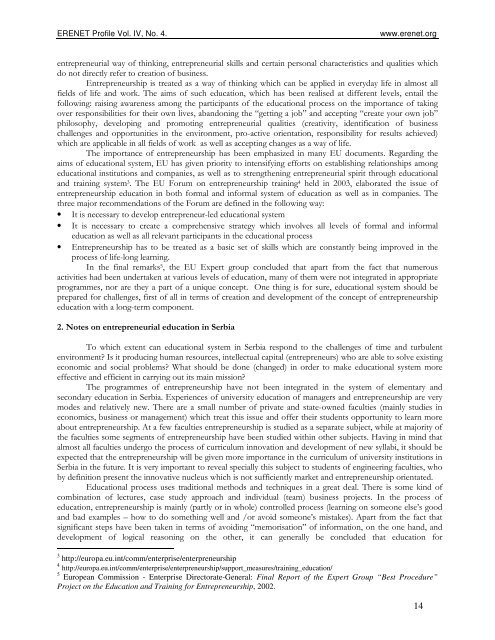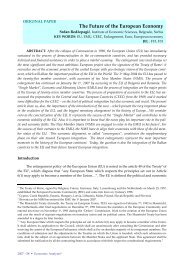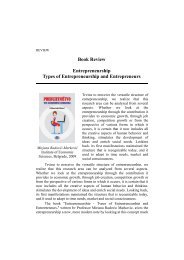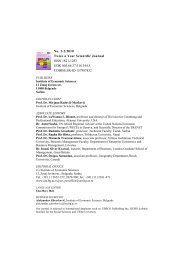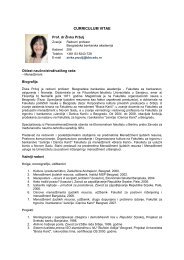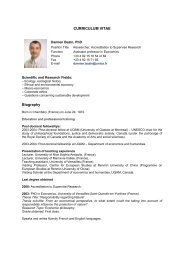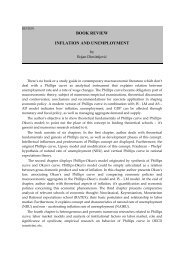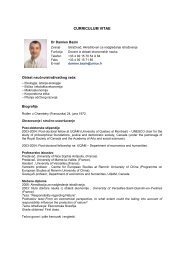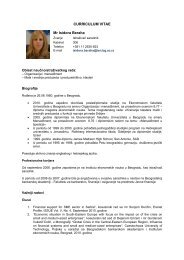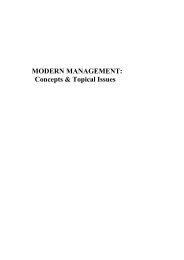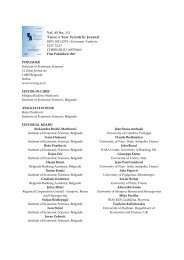Issue 16
Issue 16
Issue 16
You also want an ePaper? Increase the reach of your titles
YUMPU automatically turns print PDFs into web optimized ePapers that Google loves.
ERENET Profile Vol. IV, No. 4.<br />
www.erenet.org<br />
entrepreneurial way of thinking, entrepreneurial skills and certain personal characteristics and qualities which<br />
do not directly refer to creation of business.<br />
Entrepreneurship is treated as a way of thinking which can be applied in everyday life in almost all<br />
fields of life and work. The aims of such education, which has been realised at different levels, entail the<br />
following: raising awareness among the participants of the educational process on the importance of taking<br />
over responsibilities for their own lives, abandoning the “getting a job” and accepting “create your own job”<br />
philosophy, developing and promoting entrepreneurial qualities (creativity, identification of business<br />
challenges and opportunities in the environment, pro-active orientation, responsibility for results achieved)<br />
which are applicable in all fields of work as well as accepting changes as a way of life.<br />
The importance of entrepreneurship has been emphasized in many EU documents. Regarding the<br />
aims of educational system, EU has given priority to intensifying efforts on establishing relationships among<br />
educational institutions and companies, as well as to strengthening entrepreneurial spirit through educational<br />
and training system 3 . The EU Forum on entrepreneurship training 4 held in 2003, elaborated the issue of<br />
entrepreneurship education in both formal and informal system of education as well as in companies. The<br />
three major recommendations of the Forum are defined in the following way:<br />
• It is necessary to develop entrepreneur-led educational system<br />
• It is necessary to create a comprehensive strategy which involves all levels of formal and informal<br />
education as well as all relevant participants in the educational process<br />
• Entrepreneurship has to be treated as a basic set of skills which are constantly being improved in the<br />
process of life-long learning.<br />
In the final remarks 5 , the EU Expert group concluded that apart from the fact that numerous<br />
activities had been undertaken at various levels of education, many of them were not integrated in appropriate<br />
programmes, nor are they a part of a unique concept. One thing is for sure, educational system should be<br />
prepared for challenges, first of all in terms of creation and development of the concept of entrepreneurship<br />
education with a long-term component.<br />
2. Notes on entrepreneurial education in Serbia<br />
To which extent can educational system in Serbia respond to the challenges of time and turbulent<br />
environment? Is it producing human resources, intellectual capital (entrepreneurs) who are able to solve existing<br />
economic and social problems? What should be done (changed) in order to make educational system more<br />
effective and efficient in carrying out its main mission?<br />
The programmes of entrepreneurship have not been integrated in the system of elementary and<br />
secondary education in Serbia. Experiences of university education of managers and entrepreneurship are very<br />
modes and relatively new. There are a small number of private and state-owned faculties (mainly studies in<br />
economics, business or management) which treat this issue and offer their students opportunity to learn more<br />
about entrepreneurship. At a few faculties entrepreneurship is studied as a separate subject, while at majority of<br />
the faculties some segments of entrepreneurship have been studied within other subjects. Having in mind that<br />
almost all faculties undergo the process of curriculum innovation and development of new syllabi, it should be<br />
expected that the entrepreneurship will be given more importance in the curriculum of university institutions in<br />
Serbia in the future. It is very important to reveal specially this subject to students of engineering faculties, who<br />
by definition present the innovative nucleus which is not sufficiently market and entrepreneurship orientated.<br />
Educational process uses traditional methods and techniques in a great deal. There is some kind of<br />
combination of lectures, case study approach and individual (team) business projects. In the process of<br />
education, entrepreneurship is mainly (partly or in whole) controlled process (learning on someone else’s good<br />
and bad examples – how to do something well and /or avoid someone’s mistakes). Apart from the fact that<br />
significant steps have been taken in terms of avoiding “memorisation” of information, on the one hand, and<br />
development of logical reasoning on the other, it can generally be concluded that education for<br />
3 http://europa.eu.int/comm/enterprise/enterpreneurship<br />
4 http://europa.eu.int/comm/enterprise/enterpreneurship/support_measures/training_education/<br />
5 European Commission - Enterprise Directorate-General: Final Report of the Expert Group “Best Procedure”<br />
Project on the Education and Training for Entrepreneurship, 2002.<br />
14


